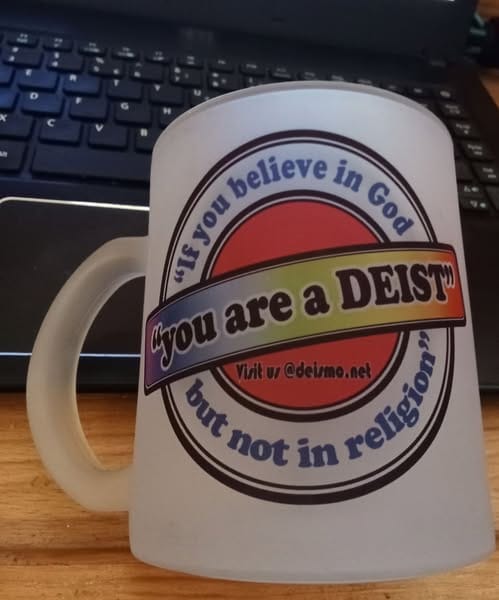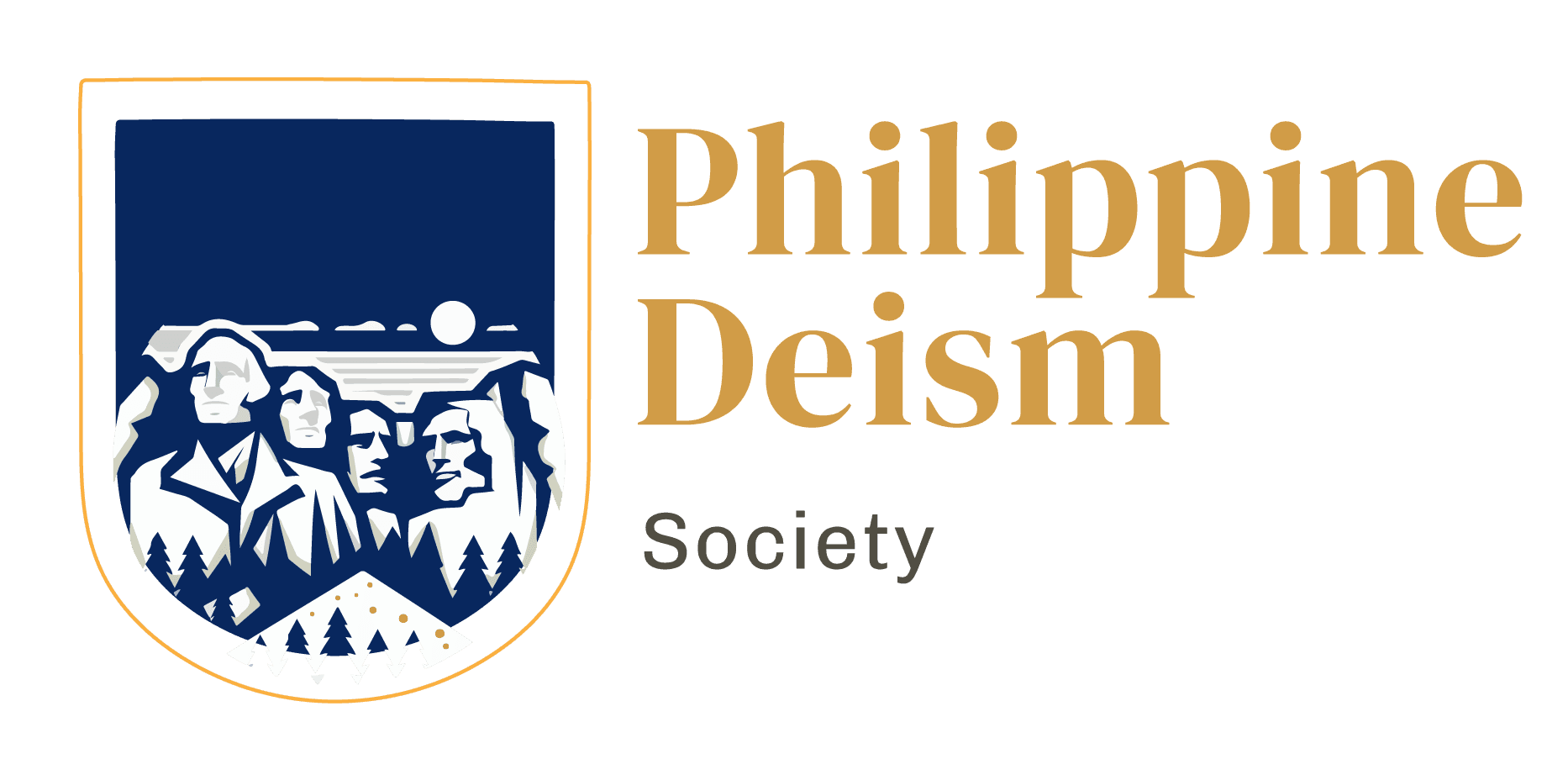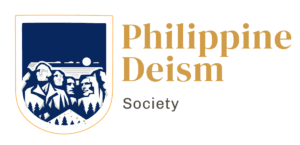Note: >TRI = three, >FECTA = perfect. >>>TRIFECTA= three winners in perfect combination
Philippine Deism Society’s three-pronged program for advocacy:
> The Library — a collection of books and articles about deism — past, present and future.
> The Shrine — a 20-hectare property for everything deistic — under progressive development
> The Society — the movement for advocacy — If you believe in God but not in (ritualistic) religion you are invited to join.
1. THE LIBRARY: Books and Articles Dedicated to Deism
NOTE: THE AUTHOR WELCOMES PROPOSAL FOR PUBLICATION FOR ONE OR ALL OF THE BOOKS LISTED HEREIN.
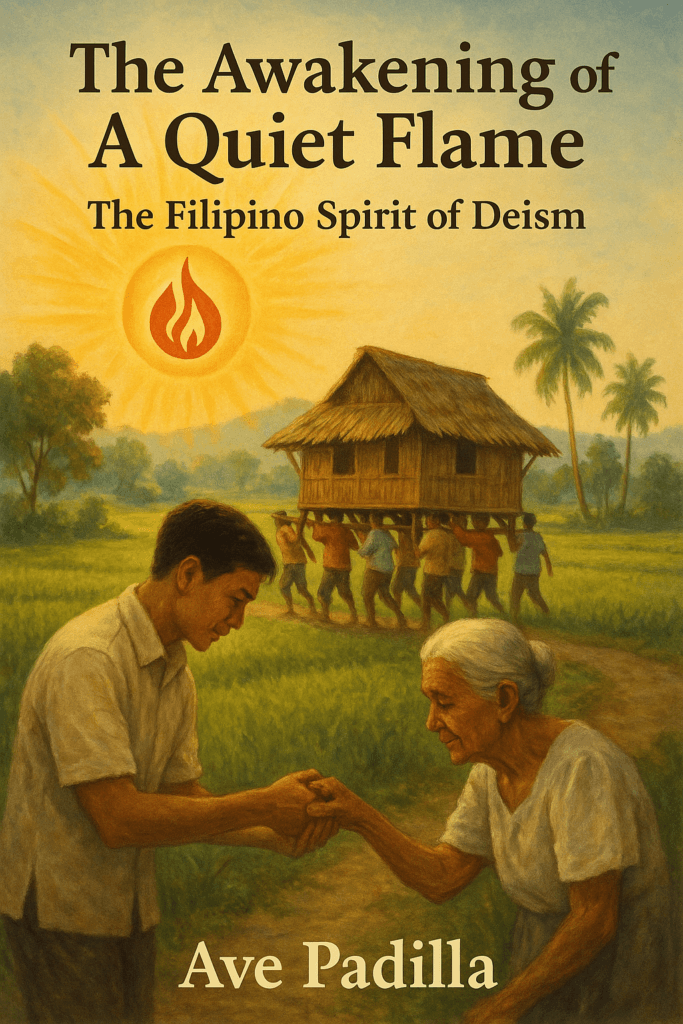
Long before the term “Deism” was known in the Philippines, its heartbeat already pulsed through the soul of our people. Rooted in reason, nature, and conscience, Deism resonates with the unspoken beliefs of countless Filipinos across generations — from the mystical babaylan of pre-colonial times to the reformist voices of the Propaganda Movement, and now to the quiet seekers disillusioned by organized religion but not by the Divine.
Ancestral Echoes: Deism in Pre-Colonial Spirituality
The ancient Filipinos did not worship out of fear, but from reverence. They saw the divine in nature — in rivers, trees, stars, and ancestral memory. The babaylan, the priest-healers of our islands, were not intermediaries between man and a jealous god, but guardians of balance, energy, and the sacredness of all life.
These early forms of spirituality were intuitive, moral, and nature-centered — resonating strongly with Deism’s core principle: the Creator reveals itself through creation, not dogma.
Though colonization disrupted this harmony, the Filipino soul quietly remembered. Even during the centuries of enforced Catholicism, the heart of our people often blended reason with ritual, conscience with custom.
Enlightened Spirits: Deism in Filipino Reformers
The late 19th century saw the rise of a uniquely Filipino enlightenment — carried by thinkers who dared to question religious authority while still honoring the Divine.
José Rizal, in Noli Me Tángere and El Filibusterismo, criticized religious hypocrisy and affirmed a God of reason and justice — not superstition. He wrote, “God does not require man to die for Him, but to live for Him.”
Graciano López Jaena exposed the arrogance of the friars and called for a faith aligned with human dignity and intellect.
Marcelo H. del Pilar, through satire, dismantled clerical abuse while affirming that moral action, not rituals, defines true faith.
Apolinario Mabini upheld moral integrity and rational principles as the true foundations of divine order.
Though none of them used the word “Deism,” their writings echo its essence: belief in a Creator who speaks not through popes or prophets, but through the voice of reason and the laws of nature.
Folk Spirituality: A Quiet Continuity
Even today, Filipino folk spirituality quietly resists institutional religion. We see it in:
The deep reverence for nature — from praying before planting to honoring mountains and rivers.
The value of conscience and utang na loob (sacred reciprocity) over rigid rules.
The belief in signs, destiny, and natural energy — not as superstition, but as intuitive spirituality rooted in experience.
These practices reveal a natural Deism — an unwritten theology of balance, reason, and respect for the unseen forces that govern life.
A Modern Resurgence
Today, a new wave of Filipinos is awakening.
Many are quietly leaving religious institutions — not for atheism, but for a freer, more honest spirituality. They seek a path where:
God is not a tyrant, but the source of cosmic order.
Faith does not contradict science, but complements it.
Morality comes not from fear of hell, but from inner integrity.
Nature is not a backdrop to worship, but the living temple of the Divine.
This is Deism — and it is rising again in Filipino minds and hearts.
From online communities to personal reflections, from the works of authors and philosophers to the quiet meditations of nature-walkers and thinkers, the Deistic spirit is reawakening.
The Role of Dambana
The (Soon to be built) Dambana Shrine and Cultural Heritage Park is envisioned as a sacred space where these ancient and modern expressions meet — a place where we can:
Reflect on the wisdom of our ancestors.
Honor our enlightened heroes.
Cultivate a spirituality rooted in reason, nature, and universal morality.
Heal from religious trauma and rediscover the Divine in freedom and peace.
Final Reflection
Deism was never foreign to the Filipino soul. It lived in the forests before the friars came, in the pens of our revolutionaries, and now, in the quiet yearning of a people longing for truth without fear.
As more Filipinos step away from doctrines and step into the sunlight of understanding, the age-old flame of Deism is rekindled — not imported, but rediscovered.
“We were Deists before we had any religion. And perhaps, we are returning not to something new — but to something we’ve always known.”
Still writing the contents. I only have the outline for now.
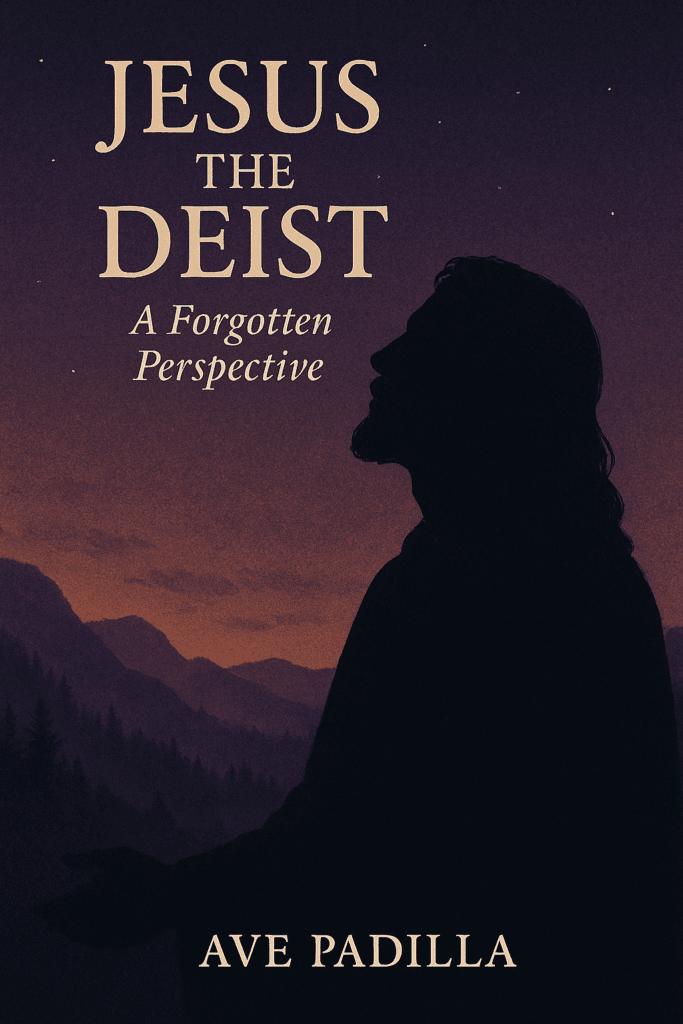
For over two thousand years, the figure of Jesus of Nazareth has remained at the heart of countless theological, philosophical, and cultural discussions. Revered as the Christ by Christians, acknowledged as a prophet by Muslims, and admired as a moral teacher by many secular thinkers, Jesus’ legacy transcends religious and ideological boundaries. But beyond the layers of tradition, dogma, and institutional interpretation, a compelling question arises: was Jesus, at his core, a Deist?
Deism, a philosophical belief that emerged with clarity during the Enlightenment, posits a Creator who established the universe with rational order and natural laws but does not interfere with it through miracles, revelations, or supernatural interventions. Deists reject the rigid dogmas of organized religion and instead advocate for a faith grounded in reason, conscience, and observation of the natural world. Deism honors the human capacity for moral and intellectual reflection as the primary pathway to understanding the divine.
When we examine the teachings of Jesus without the theological superstructures imposed by centuries of doctrinal development, we encounter a man who consistently emphasized reason, justice, personal responsibility, and moral autonomy. He challenged religious authorities, exposed the emptiness of ritualism, and called people to a higher, inward-focused spirituality rooted in love for God and neighbor. His parables often highlighted the workings of conscience, natural justice, and human compassion over religious conformity.
Throughout the Gospels, Jesus is portrayed as a moral teacher who relied more on persuasion than pronouncements, on example rather than ecclesiastical authority. His Sermon on the Mount, for instance, reads less like a divine decree and more like a rational appeal to ethical living. He asked questions that stirred the mind, invoked stories that illustrated timeless truths, and encouraged listeners to discern for themselves the path of righteousness. In his interactions with the Pharisees and temple authorities, Jesus appears not as a promoter of institutional religion, but as a reformer—perhaps even a revolutionary—who saw true spirituality as independent of ritual sacrifice, temple worship, or priestly mediation.
To be clear, Deism as a formal philosophy emerged centuries after Jesus lived. However, the essence of his teachings—especially when stripped of later theological embellishments—bears remarkable resemblance to the core values of Deism. This book explores that intersection. It does not aim to prove Jesus was a Deist in the historical or formal sense, but rather to illuminate how many of his teachings and attitudes harmonize with a Deistic worldview. In doing so, we invite readers—Deists, spiritual seekers, and open-minded Christians alike—to reconsider the man from Nazareth not as a divine intermediary, but as a profound voice of reason and moral clarity.
This reinterpretation does not diminish Jesus; rather, it liberates him from centuries of supernaturalism and restores his role as a courageous truth-teller, a philosopher of the highest order, and a teacher whose relevance persists in an age increasingly drawn to rational spirituality. Jesus’ enduring challenge was not merely to believe, but to think; not to follow blindly, but to love wisely.
As you journey through the pages that follow, you will find a portrait of Jesus that resonates with those who seek a spirituality of reason, conscience, and compassion—a Jesus who speaks not only to the religious, but to all who are committed to truth. Could it be that Jesus, far from being a founder of dogma, was actually the forerunner of Deism? Was the man Jesus the foremost Deist?
Let us explore that question together—with reverence, with reason, and with an open heart.
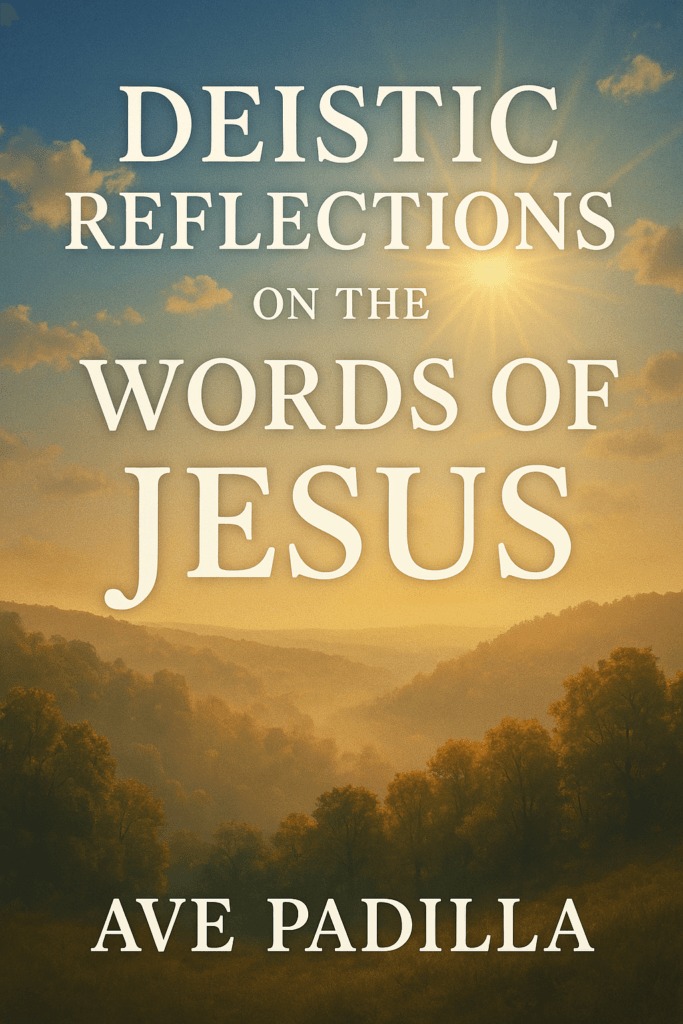
Jesus of Nazareth walked the earth not as a distant deity cloaked in mystery, but as a man among men—fully human, yet deeply attuned to the divine. He emerged in human history not as a supernatural figure demanding worship, but as a man deeply grounded in truth, conscience, and moral clarity. He lived among the people of his time, feeling what they felt, enduring what they endured, and speaking not from the throne of heaven but from the soil of everyday life. He taught with conviction, not to elevate himself, but to awaken the dignity and moral responsibility already present within every human being.
His life reflected the noblest ideals of humanity—compassion, courage, humility, and reason. Rather than seek power or recognition, he chose the difficult path of service, challenging the corrupt systems of his day and calling people back to inner integrity and a natural reverence for what is right. His wisdom was not mystical or esoteric, but grounded in common sense and universal values, accessible to any open heart and seeking mind.
To view Jesus as a man is not to diminish him—it is to see him more clearly. His strength lay not in claiming divine status, but in embodying the deeper possibilities of human nature when guided by the light of reason and the whisper of conscience. For the Deist, Jesus stands not as an object of worship but as a profound example of what it means to live in harmony with the divine order of nature and truth. In him, we see not a god made man, but a man who mirrored the divine through his words, his actions, and his fearless pursuit of truth.
The words of Jesus have resonated through centuries, shaping the moral and spiritual landscape of countless individuals and cultures. While often interpreted within the framework of traditional religious belief, these teachings hold a deeper, universal wisdom that transcends sectarian boundaries. In this book, we explore how the teachings of Jesus align with the core principles of Deism—an enlightened view of the divine that recognizes a Creator who operates through reason and natural laws, rather than through intervention in the world.
Jesus’ messages of love, justice, personal responsibility, and compassion find a natural home in Deism, which emphasizes the importance of moral behavior, intellectual freedom, and reverence for the natural world. Through these reflections, we will uncover how his words offer profound insights into living a life guided by reason, virtue, and a deep connection to the universe, understood not as a personal deity but as the energy and laws that govern all things.
This book does not aim to diminish the significance of Jesus’ words within traditional contexts but seeks to highlight how they resonate with the rational spirituality that defines Deism. It offers an opportunity to see the teachings of Jesus through a lens that encourages personal exploration, intellectual honesty, and a greater understanding of our place in the cosmos.
Whether you approach this work from a background of Deism, another philosophical tradition, or simply a desire to explore deeper meanings in the teachings of Jesus, this book invites you on a journey of reflection and discovery. It is an invitation to embrace the timeless truths embedded in Jesus’ words, freed from dogma, and guided by the light of reason.
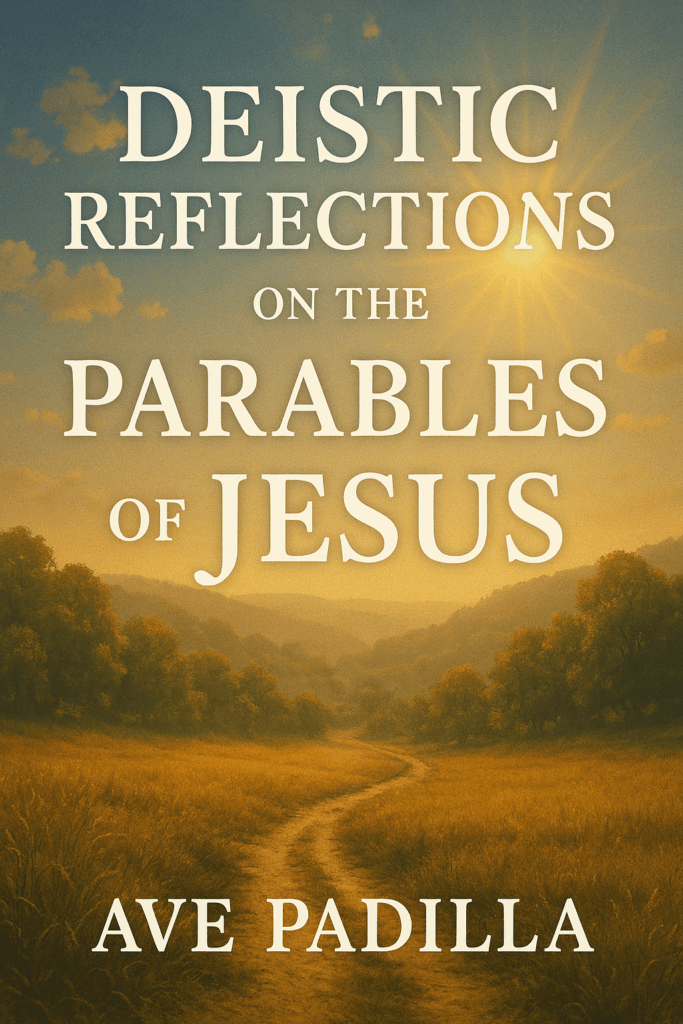
The Evolving Wisdom of the Parables: A Journey from Renewal to Harvest
The parables of Jesus, when viewed through the calm and discerning lens of Deism, reveal more than isolated moral teachings—they unveil a profound spiritual progression. Beneath their surface simplicity lies an intentional movement: from the tearing of old garments to the ripening of the final harvest, each parable builds upon the next, inviting the seeker on a journey from inner renewal to outward fulfillment.
This journey begins with parables of contrast and incompatibility: new cloth on old garments, new wine in old wineskins. These images point to the necessity of spiritual awakening—an invitation to let go of inherited forms, rigid doctrines, and outdated frameworks. They call for a renewal of mind, a readiness to receive a living, dynamic understanding of the Divine rooted not in fear, but in reason and conscience.
Once this inner space is cleared, the parables turn to the language of growth: the sower and the seed, the soil and the sprout. Here, Jesus speaks as a philosopher of nature. The human heart is likened to earth, capable of nurturing or stifling truth. Growth does not happen overnight; it follows the quiet rhythm of seasons, of patient tending, of unseen yet inevitable unfolding. These stories remind us that spiritual truth, like a seed, is not imposed but planted—meant to be discovered, nurtured, and matured within.
As the parables progress, so does the vision. The themes expand from the individual soul to the collective good: mustard seeds growing into trees, yeast leavening the dough, nets gathering fish, and fields yielding wheat. These are not warnings of wrath but metaphors of realization. The harvest is not destruction, but the culmination of a life lived in harmony with nature, reason, and moral purpose.
This natural arc—from renewal to planting, from tending to fruition—is neither accidental nor merely poetic. It reflects the very structure of life itself. It mirrors the Divine Order Deists affirm: a universe governed not by whim or miracle, but by wisdom, law, and continuity.
In the pages that follow, each parable will be explored through this Deistic perspective—liberated from dogma, illuminated by reason, and grounded in nature’s own design. May these ancient stories, re-read in the light of enlightened spirituality, inspire in us a deeper reverence for the God of order, growth, and truth—and guide us along our own quiet path from seed to harvest.
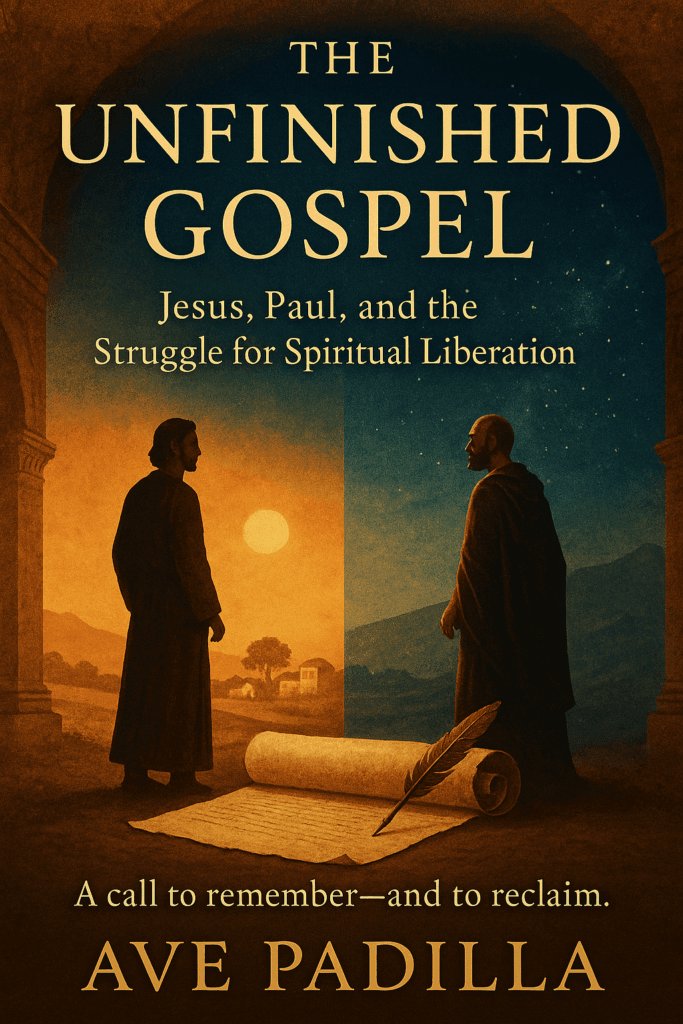
What if the Gospel we inherited is not the one Jesus intended?
What if Paul, history’s most influential interpreter of Christ, was still evolving—his message a work in progress rather than a finished creed?
In this thought-provoking exploration, Ave Padilla invites readers to revisit the teachings of Jesus and the writings of Paul—not to create division, but to seek deeper harmony. With reverence and reason, the book uncovers the perceived tension between the radical humanism of Jesus and the theological constructions that followed. It does not reject Paul, but seeks to redeem his voice—tracing his spiritual journey toward the liberating core of Jesus’ message: that the Kingdom of God is within us.
This is not just a theological reflection. It is a call to spiritual courage.
The Unfinished Gospel is for those disillusioned by dogma yet still drawn to the figure of Jesus. It is for seekers yearning for faith without fear, for spirituality rooted in conscience, and for a Gospel that breathes with freedom, dignity, and hope.
“This book explores the spiritual tension between Jesus and Paul—not to condemn, but to understand and redeem. It invites seekers to rediscover the liberating, universal, and humanistic core of Jesus’ teachings while tracing Paul’s journey toward alignment with that vision. It is a call to spiritual liberation through a deeper harmony between the prophetic voice of Jesus and the evolving insights of Paul.”
The Unfinished Gospel: Jesus, Paul, and the Struggle for Spiritual Liberation” is a redemption for Paul to align his “often contentious” teachings with Jesus.
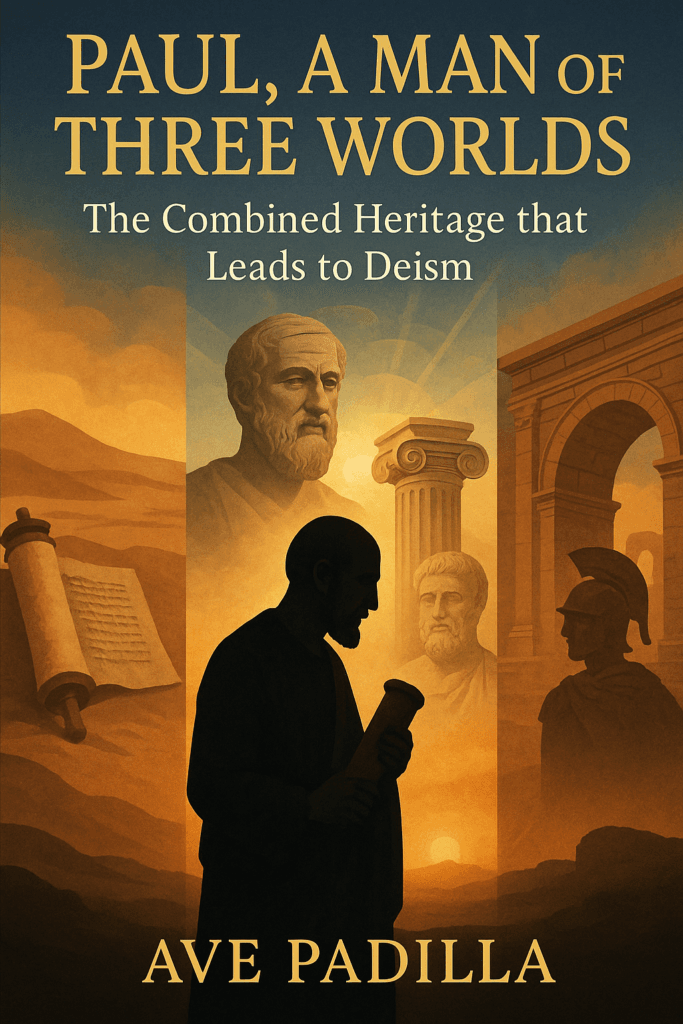
The apostle Paul, once a strict legalist, came to realize a profound truth: “The letter kills, but the Spirit gives life.” (2 Corinthians 3:6)
In Romans 7:10, Paul says: “I found that the very commandment that was intended to bring life actually brought death.”
These verses reveal his shift from rigid adherence to religious law toward a more dynamic, inner spiritual awakening. Paul began to sense that true connection with the Divine does not come through dogmatic obedience to text (Bible), but through an inner awareness—reason, conscience, and the vital Spirit that animates life itself.
In sharp contrast, John Calvin’s doctrine of Sola Scriptura—the belief that the Bible alone is the supreme authority in matters of faith—elevates written text to near-divine status. Calvin’s insistence on Scripture as the final arbiter of all spiritual truth reimposes the very letter Paul warned against. This position binds faith to a book, a human collection of writings shaped by time, politics, and cultural limitations.
While Sola Scriptura was a protest against ecclesiastical tyranny, it merely replaced one form of dogma with another: the Bible in place of the Church. In doing so, it ironically returned authority to the very “letter” that Paul said kills—because it leads to rigid systems, sectarianism, and a faith disconnected from reason and the unfolding wisdom of nature.
The Deistic View
Deism affirms that the Divine Spirit is not trapped in ancient texts but is alive in the laws of nature, the moral compass within, and the reason endowed to all.
Where Sola Scriptura demands conformity to scripture, Deism invites us to listen to the Spirit that gives life—through nature, conscience, and reason.
As Paul himself learned, the Divine is not confined to ink and parchment (Bible) but breathes in every sunrise, every act of compassion, and every truth discovered by honest inquiry.
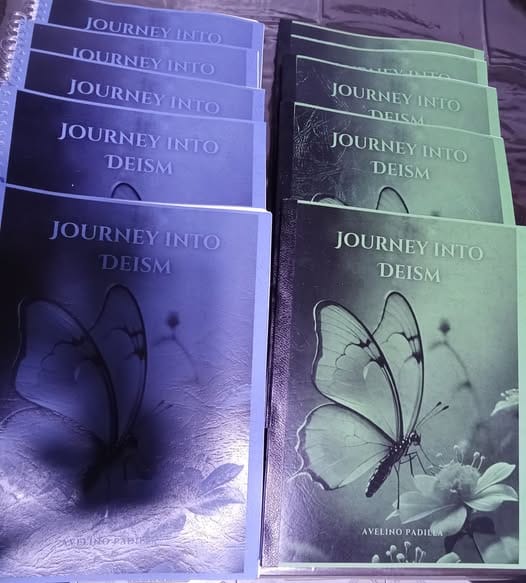
This book is about a journey — a historical and philosophical evolution that led the author from the teachings of Christianity to the broader path of Deism. While countless others have embarked on similar journeys, the author believes this story will resonate with those who have questioned their faith or sought deeper meaning in their spiritual lives. A story almost similar to this could be anyone’s journey to which the author is thankful for having the privilege to write.
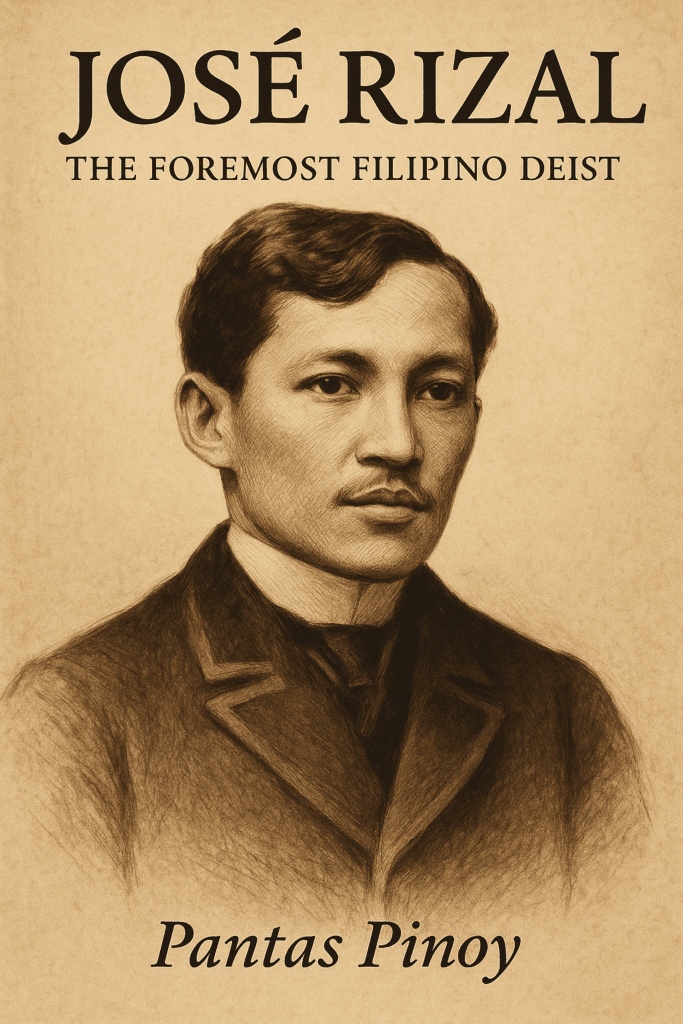
For generations, Filipinos have looked to José Rizal not only as a national hero but as a moral compass, a visionary who saw beyond his time. We admire his intelligence, his love of country, and his courage to stand against tyranny. But beneath his eloquent prose and principled stand lies something deeper—an inner light, a spiritual force rooted not in religious dogma, but in reason, nature, and the sacredness of truth.
This book invites readers to discover a different dimension of José Rizal—the spiritual Rizal, the rational believer, the proto-Deist whose view of the Divine was shaped more by conscience than creed, more by observation than orthodoxy. He did not reject God; rather, he rejected the misrepresentations of God perpetuated by a corrupt religious establishment.
In a time when religion was used to control and silence, Rizal dared to think, to question, to seek. He saw the Creator not in gilded altars or fearsome sermons, but in the beauty of the natural world, the dignity of every human soul, and the order and wonder of the universe. He did not kneel blindly; he stood with clarity, reverence, and courage.
This is not a work of theology, nor a rewriting of Rizal’s legacy—it is a spiritual reflection grounded in his writings, his worldview, and his quiet but radical faith in reason and justice. It is Deism in a Filipino voice: humble, poetic, defiant, and deeply human.
In today’s world, many Filipinos are awakening from centuries of inherited belief systems. Some are leaving organized religion but still seek connection to something greater. Others hunger for a moral life rooted in reason and compassion, not threats of punishment or empty ritual. This is where Rizal becomes profoundly relevant.
His life becomes more than a historical memory—it becomes a spiritual mirror.
Through these pages, may you see not just a hero of the past, but a guide for our time. May Rizal’s spirit awaken the sacred light already within you. And may this journey lead you to a faith that is free, intelligent, and fully alive.
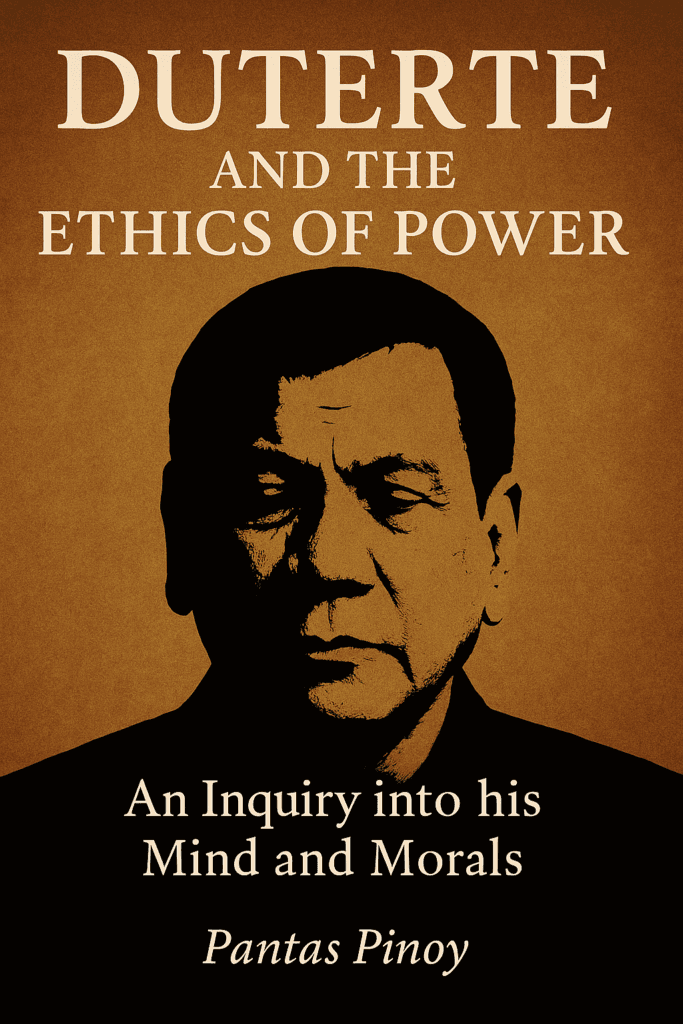
Deism may seem foreign in a nation steeped in centuries of Catholic tradition. But its spirit lives quietly in the country’s intellectual past—in the works of José Rizal, Apolinario Mabini, and Graciano López Jaena. These thinkers resisted blind faith and clerical tyranny not out of atheism, but out of reverence for conscience and truth. They upheld the Enlightenment ideal that reason is divine, and that freedom of thought is essential to national dignity.
Rodrigo Duterte did not walk in their philosophical footsteps. He is not a Deist in any academic sense. But his rhetoric, choices, and confrontations with institutional religion raise an intriguing question: was there—beneath the profanity, populism, and paradox—a flicker of Deistic intuition? Did Duterte, in his own brash and broken way, express a yearning for moral clarity outside the bounds of traditional religion?
In the pages that follow, we explore Duterte not as a moral archetype, but as a man: flawed, complex, perhaps even searching. Through the lens of Deism, we may not discover a prophet—but we may find a prism through which to better understand our politics, our history, and the ethical future we must now dare to shape.
This book does not seek to canonize Duterte as a misunderstood prophet, nor to condemn him as a tyrant cloaked in populist garb. It attempts something both simpler and harder: to understand him without illusion.
This book does not offer easy answers. Instead, it invites reflection. On Duterte, yes—but more importantly, on ourselves. What kind of leaders do we choose? What do we sacrifice for order? And can we, as a nation, grow from faith to reason—without losing our soul in the process?
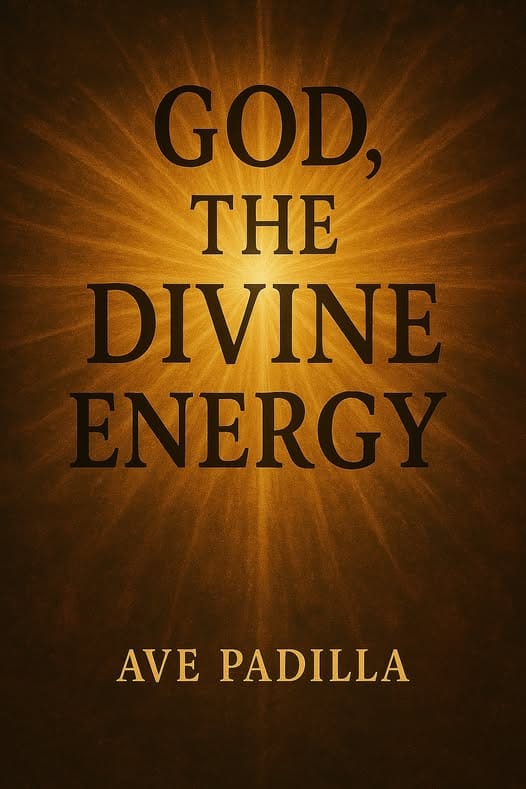
My understanding of divine energy is that it is the primordial force, substance, source, or principle that created all existence.
Since the dawn of consciousness, humankind has sought to unravel the mysteries of existence. Our earliest ancestors gazed at the stars, their hearts swelling with wonder and trepidation. They heard the whispers of the wind and the thunderous roars of storms, interpreting these forces of nature as voices of gods or spirits, entities that could explain the unfathomable and govern the unknown. Nature, in its raw and untamed grandeur, was humanity’s first temple—a canvas upon which they painted their earliest conceptions of the sacred, of the divine, and of the gods.
Nature, in its boundless majesty, evoked a primal reverence from early humans. The towering mountains seemed like stairways to the heavens, while the vast oceans hinted at depths beyond mortal comprehension. The cycles of the sun, moon, and stars became the first symbols of order within chaos, their constancy inspiring awe and sparking wonder. The rustle of leaves in the forest, the howl of the wind across barren plains, and the eruption of volcanoes all served as reminders of forces greater than themselves—forces that demanded respect, fear, and adoration. These encounters with nature’s power and beauty formed the foundation of humanity’s spiritual imagination, giving rise to myths, stories, and rituals that sought to honor and explain the divine.
But as human societies grew, so did their imagination and fears. The simple reverence for nature’s power gave way to superstition. Deities multiplied, each assigned domains over the harvest, the hunt, fertility, and fate. Rituals and sacrifices became tools to appease these unseen powers, to bring order to chaos. Superstition became a framework for understanding an unpredictable world, a coping mechanism for the frailty of human life. It was here that man’s quest for God became intertwined with power, control, and the desire to make sense of suffering.
Yet even as superstition held sway, the seeds of doubt and curiosity began to sprout. Among the sages and philosophers of ancient civilizations, questions arose: What lies beyond these myths? What is the essence of the divine? Through philosophy, humanity turned inward, seeking not just to understand the heavens but to comprehend the human mind and its connection to the cosmos. In this era of reason, the gods of myth were scrutinized, and higher concepts of morality, ethics, and metaphysics emerged. Man’s search for God shifted from the external to the internal, from the tangible to the abstract, from the invisible to the visible.
And now, in the age of science, the search continues. Equipped with instruments of precision and minds trained in empirical inquiry, humanity delves deeper into the fabric of reality. The telescope peers into the farthest reaches of space, the microscope into the smallest building blocks of life. With each discovery, the boundaries of the unknown shrink, yet the questions of purpose and existence remain as profound as ever. Is God to be found in the equations that govern the universe, in the elegant dance of particles and waves, or is it (He) hidden in plain sight?
THIS BOOK TRACES THE HISTORY OF HUMANITY’S ENDURING SEARCH FOR GOD, moving through the awe of nature, the fear of superstition, the introspection of philosophy, and the rigor of science. It is a journey not merely of discovery but of transformation—an exploration of how our understanding of the divine has evolved alongside our understanding of ourselves. Perhaps, in tracing this journey, we may come closer to answering the eternal question: What/Who is God?
Hereby, I offer my humble opinion, the result of years of research and contemplation.
2. THE SHRINE:
DAMBANA: The Deism Shrine and Cultural Heritage Park
NOTE: THE PHILIPPINE DEISM SOCIETY WELCOMES EXPRESSIONS OF INTEREST FOR INVESTMENT IN THE DEVELOPMENT OF THE SHRINE.
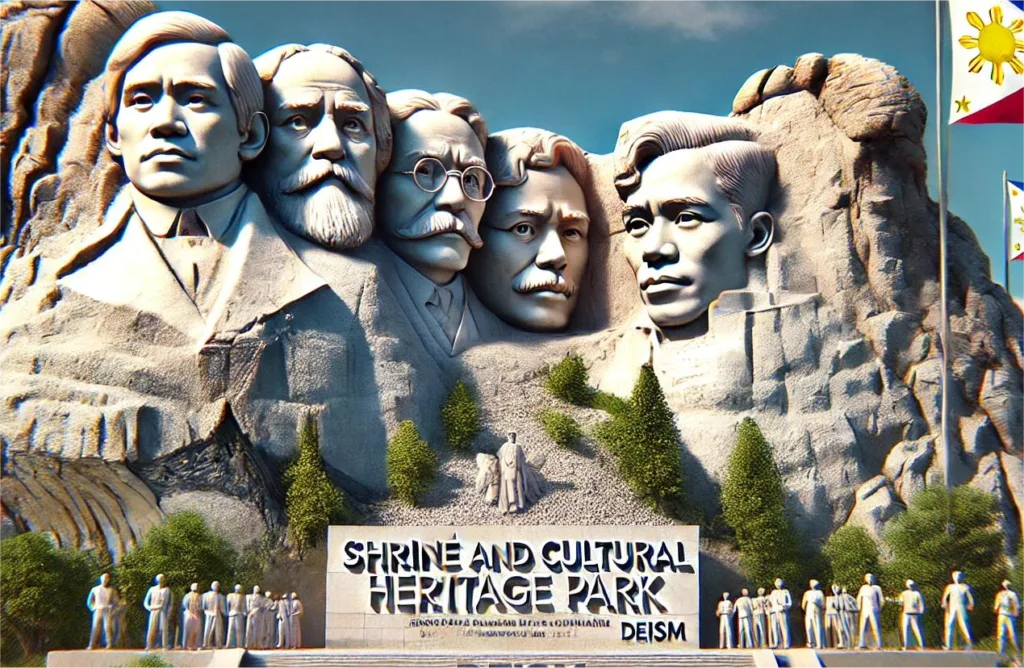

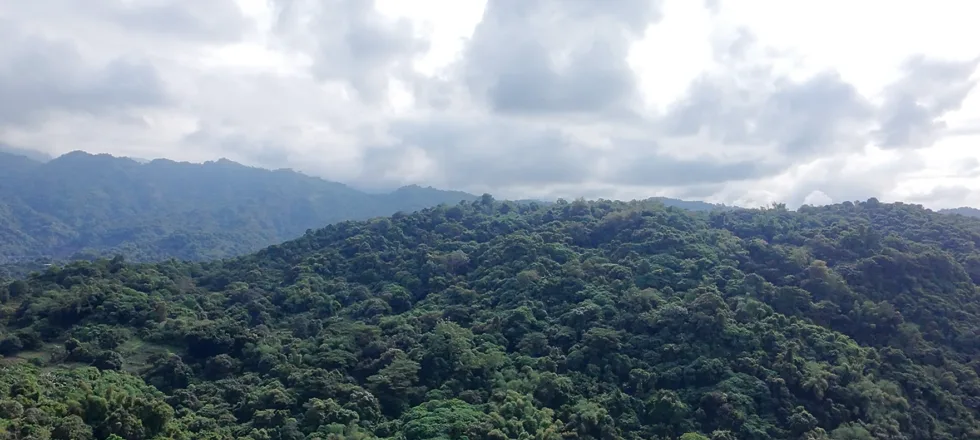
A one-of-a-kind global landmark where individuals can explore God’s rational nature through philosophy, science, and ethical living. Designed as a sanctuary for free thought, non-religious spirituality, and intellectual inquiry, it will foster a deep reverence for the natural order. The essence of Deism—God’s rationality, intelligence, and creative force—will be seamlessly integrated into its architecture, educational programs, and overall visitor experience.
The Deism Shrine and Cultural Heritage Park is more than just a physical space—it is a living testament to the power of reason, the beauty of nature, and the pursuit of moral and intellectual progress. By fostering an environment where free thought, rational spirituality, and cultural preservation thrive, this sanctuary stands as a beacon for those seeking truth beyond dogma and fear-based ideologies.
Through its events, exhibits, and community initiatives, the shrine will provide a refuge for seekers, thinkers, and reformers—those who wish to engage in meaningful dialogue, reflect on life’s deepest questions, and celebrate the harmony between human reason and the natural world. It will serve as a guiding light for those navigating their own spiritual journeys, offering wisdom, encouragement, and a sense of belonging.
In honoring the legacy of Deist thinkers and visionaries, the shrine will inspire present and future generations to embrace intellectual freedom, ethical living, and a profound connection with the universe. As a monument to reason and moral progress, it will not only preserve the past but also shape a more enlightened and compassionate future.
Follow us as we develop the Shrine:
3. THE SOCIETY:
NOTE: IF YOU BELIEVE IN GOD BUT HAVE PUZZLING QUESTIONS ABOUT RELIGION, JOIN US. WE WANT TO BUILD THE SOCIETY NATIONWIDE, AND BEYOND.

Creating a deist society offers numerous benefits, particularly for individuals who resonate with deist principles and seek a community that aligns with their worldview. Here are some key advantages:
Fostering Community Among Like-Minded Individuals
Shared Values: A deist society can provide a space for people with similar beliefs to connect and discuss their understanding of spirituality, reason, and the natural world.
Sense of Belonging: It offers an opportunity to form meaningful relationships in a non-dogmatic, inclusive environment.
Promoting Rational Inquiry and Intellectual Growth
Discussion Forums: Members can engage in debates and discussions on philosophy, ethics, science, and spirituality, encouraging critical thinking.
Educational Opportunities: Hosting lectures, workshops, and reading groups can help members expand their knowledge and understanding of deist philosophy and related topics.
Providing an Alternative to Organized Religion
Freedom of Thought: A deist society offers a spiritual alternative to traditional religions, focusing on reason and observation without requiring adherence to scripture or rituals.
Support for the Religiously Unaffiliated: It can attract those who are spiritual but disillusioned with conventional religious institutions.
Advancing Ethical and Moral Dialogue
Collaborative Morality: Members can explore ethical issues through reasoned dialogue, helping to establish a shared moral framework without relying on divine commands.
Community Service: The society could engage in charitable work or activism, aligning moral principles with actions.
Advocacy and Awareness
Raising Awareness of Deism: A society can help spread understanding of deist principles to the broader public, showing it as a viable spiritual path.
Counteracting Misconceptions: It can address misunderstandings about deism, such as its differences from atheism or agnosticism, and highlight its historical significance.
Encouraging Personal Growth
Self-Reflection: Through group discussions and personal exploration, members can develop a deeper understanding of their own beliefs and values.
Non-Judgmental Environment: A society focused on reason and openness allows for growth without fear of dogmatic judgment.
Creating a Generational Legacy
Preserving and Expanding Ideas: By organizing, a deist society can document, share, and expand on deist thought for future generations.
Influencing Broader Culture: It can contribute to cultural conversations about the role of spirituality, reason, and ethics in modern life.
